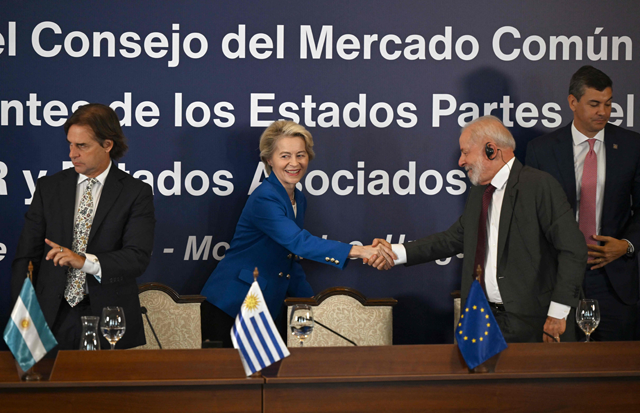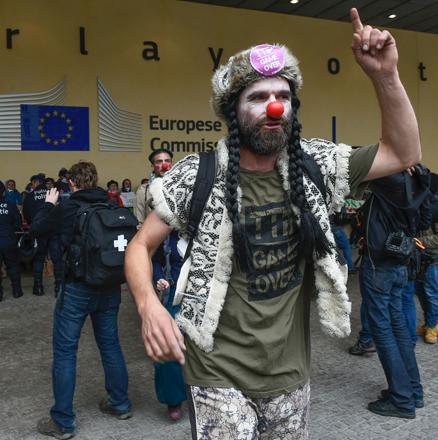You are here
Breeders fear EU-Mercosur pact will make mincemeat of Belgium beef
By AFP - Jul 28,2019 - Last updated at Jul 28,2019

A Limousin breed cow is held by the bridle during the Libramont outdoor agricultural fair in Libramont, Belgium on Friday (AFP photo)
LIBRAMONT, Belgium — The Libramont agricultural show is the highlight of the year for Belgium's proud beef industry, but this year even the sunny skies of western Europe's record heatwave couldn't chase one looming shadow away.
The breeders parading their famous Belgian Blue beef cattle will soon face competition from the vast ranches of the South American pampas.
Resistance is building among some European farmers against a draft trade deal reached by EU officials with the Mercosur group — Argentina, Brazil, Paraguay and Uruguay.
After 20 years of negotiations, officials in Brussels — 140 kilometres northwest of the pastures of Ardennes — are very pleased with the accord that could save European exporters four billion euros ($4.5 billion) in duties per year.
But, as member states decide whether to ratify and implement the deal, EU farmers and environmentalists are less excited.
Beef breeders, in particular, say that EU quality standards are higher than those in Latin America, and fear a flood of cheap meat will drive them to the wall.
"We are already close to over-production in all of Europe and in Wallonia as well... The last thing we need is Brazilian meat, especially when we see the conditions in which it is produced", warns Hughes Falys, beef producer and farmers' union spokesman.
'Bad deal'
"Mercosur isn't a case of 'Yes, maybe' or 'Yes, if'. Mercosur is 'No!'," declares the Wallonia regional farming minister, Rene Collin, to loud applause.
Collin might not be a regular on the G-20 summit circuit or at WTO get-togethers. But the world's trade negotiators may find they have to listen to the French-speaking Belgian region of Wallonia, home to only 3.6 million people.
In 2016, the region held up Belgium's signature of the CETA trade deal between the entire EU and Canada, and it could make life complicated for Brussels once again.
"We made them evolve CETA. We made them put important safeguard clauses in there. We'll be just as vigilant when it comes to Mercosur," Collin told AFP at the four-day fair and trade show.
He warns that the regional parliament and Belgium's members of the European Parliament could vote against ratification.
The European Commission has tried to reassure farmers, so far to no avail.
The deal contains two big promises to the sector: Increased beef imports will be limited to 99,000 tonnes a year, and one billion euros will be set aside for European farmers.
Farmers at Libramont are unconvinced and pessimistic for the future despite the impressive size and quality of their livestock, proudly on display.
"Lots of older farmers find it difficult to sell up, especially livestock farmers," says Beatrice Ghyselen, a 61-year-old farmer from Vedrin, outside the Wallon capital Namur.
"My children and their spouses are interested in growing crops, but pretty sceptical about betting on beef," she says.
Ghyselen's family pioneered the introduction of Limousin cattle in Belgium, and she still has 300 head of cattle.
Beef prices may be high in European shops right now, she admits, but production costs are relatively higher still and farmers' margins are tight. Ghyselen would like to see a more detailed labelling system to educate consumers.
For his part, 49-year-old Falys keeps 50 Charolais cattle.
A small herd, but he concentrates on directly serving local retail with high quality product, cutting out the supermarket chains.
Jean-Luc Pierret, 64, and his son Xavier, have been growing their cattle with organic feed in Orgeo, outside Libramont since 1999.
Their blonde Aquitaine cattle look fine on the diet, and a magnificent bull wins third place at the fair, but they are not confident of continued commercial success.
"I've haven't got a good feeling about it," Xavier says of a future dominated by huge world trading blocs.
"From what I can see, the farmer is no longer number one. I wish the young ones courage, they'll need it."
The EU-Mercosur pact will not enter into effect until the parliaments of all 28 — or 27 after Brexit — member states give the go ahead. The ratification process is expected to take at least two years.
Related Articles
BRUSSELS — European leaders voiced hope for a breakthrough Wednesday in troubled negotiations for a landmark EU-Canada free trade deal, desp
BRUSSELS, Belgium — Germany and Spain hailed the conclusion Friday of a controversial free-trade deal between the European Union and South A
BRUSSELS — Belgium announced a breakthrough on Thursday to save a landmark EU-Canada free trade deal by winning over domestic holdouts who t














